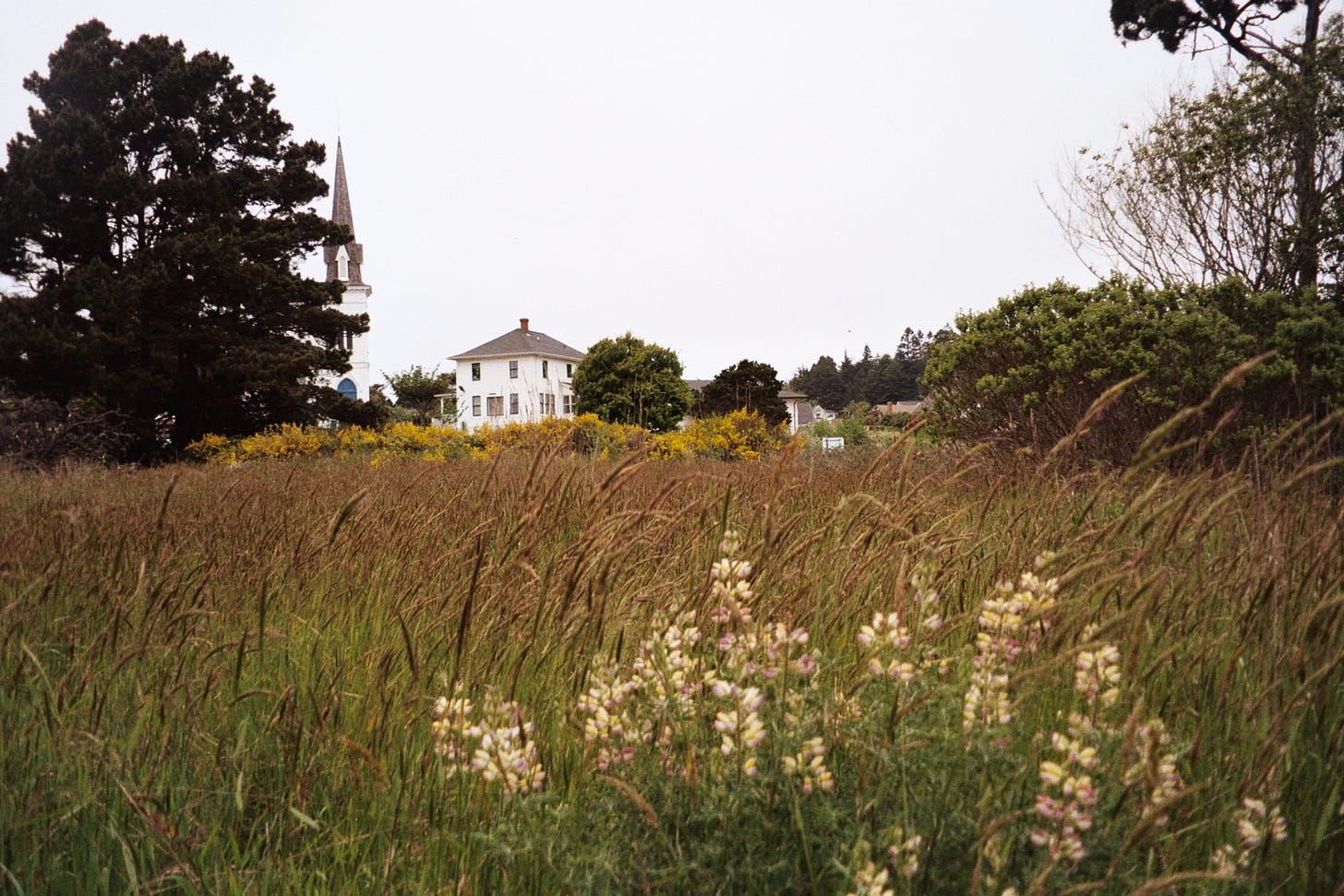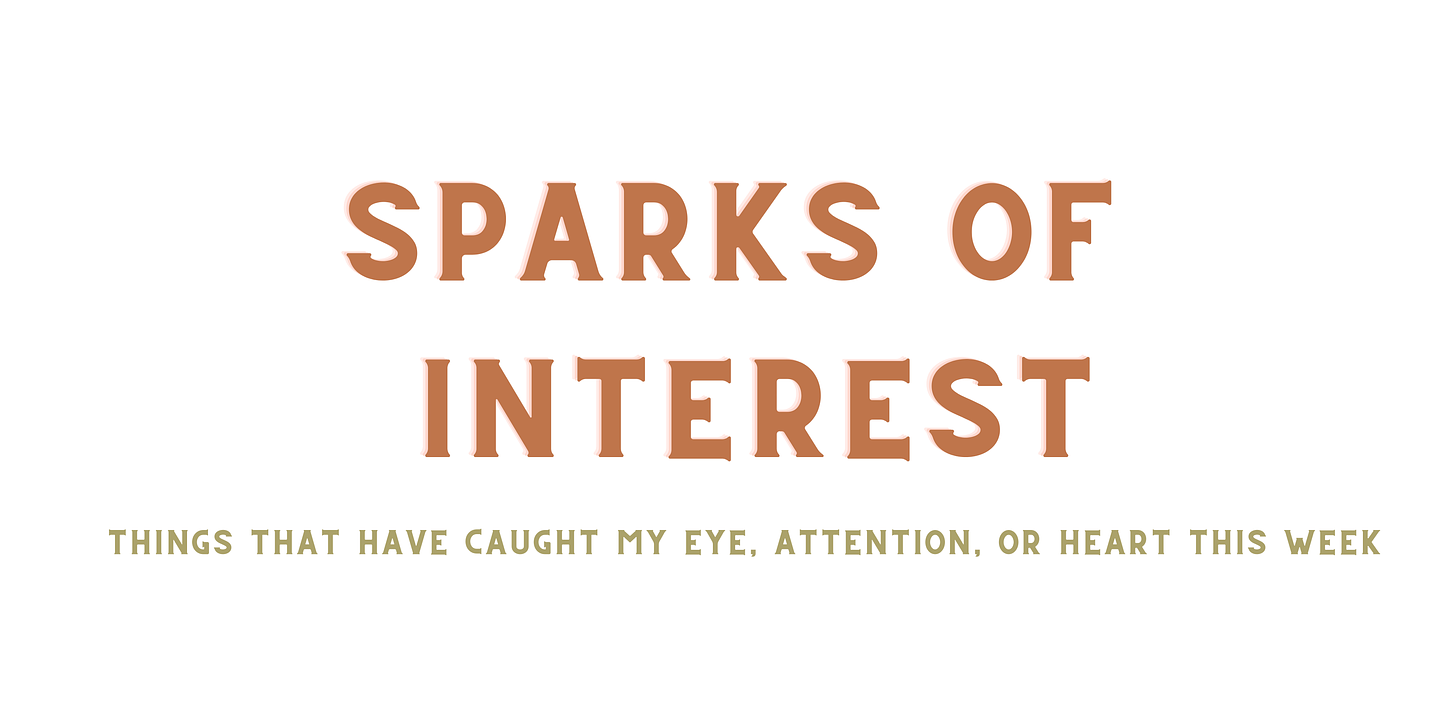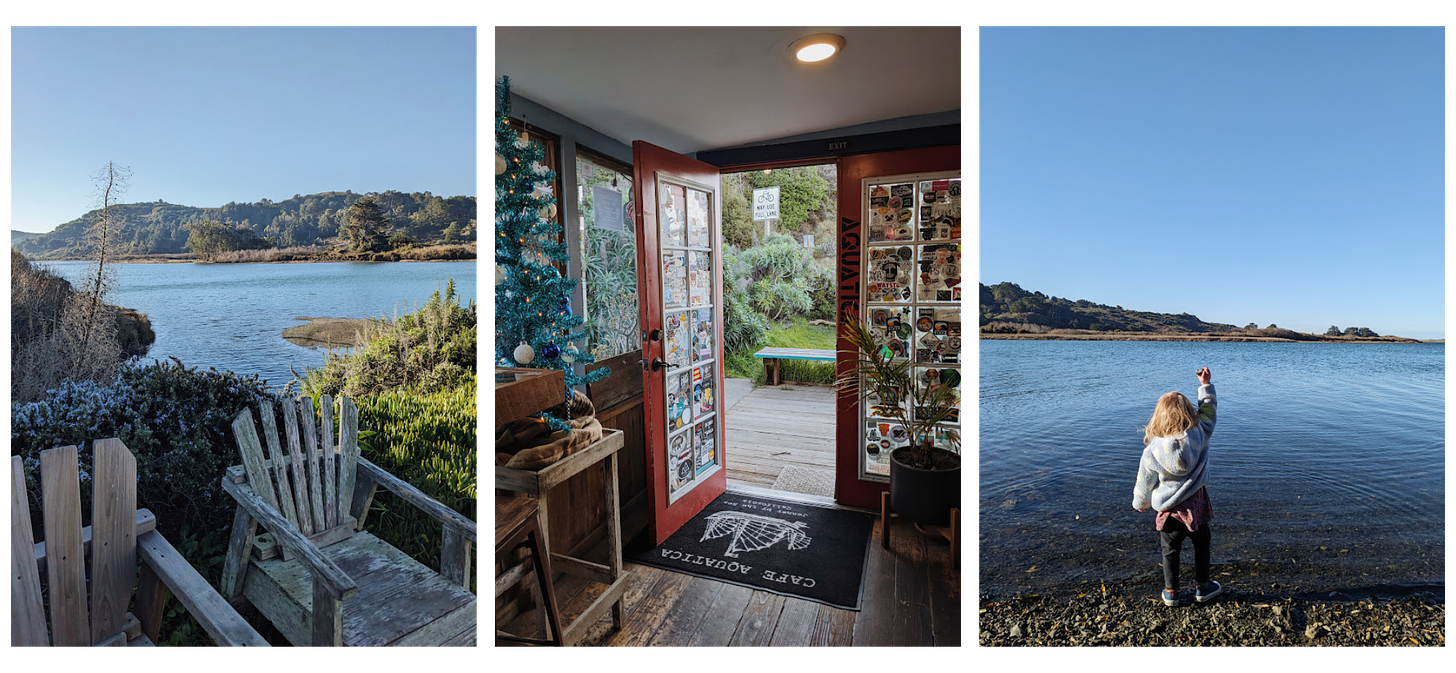Human Stuff is a weekly-ish newsletter. Please feel free to share parts of this letter that connect with you on social media, or send to someone you love. If you enjoy and benefit from my writing, I invite you to become a paid subscriber. This is a reader-supported offering and I’m so grateful for your presence here.
A song I’m loving:
The grief of the world feels too big to hold alone, yet I often find myself sitting in my backyard office in my suburban neighborhood, no other bodies nearby, holding it alone. Sometimes, I walk outside to the right of my office and sit with the redwood tree, a form of company. Yet I look out at a breaking world and feel a desperation to be sitting in circle with others who are also witnessing the unfolding horrors, who are also choosing to keep looking.
Instead, I turn to a screen, where I can witness it from afar but not up close — not from the distance where I’d hear another’s wail or even a sigh. I turn to the page, hoping for some kind of mutual understanding from a notebook. I turn to friends and comrades who live across state lines or oceans, yet I see the gap in who I can turn to in the town I live in, in the neighborhood I feel in. I find myself wanting to attend public events and protests but not always wanting to go alone. I find myself biting my tongue at extended family dinners, knowing what kind of outburst, weird look, blank stare, or condemnation will happen if I dare bring up anything beyond the surface level, if I dare name the horrors out loud. I am desperate to name the horrors out loud, with other people also doing the naming.
In past seasons of my life, I naturally merged with spaces to reckon and grieve and explore with others: when I was in college, or when I had coworkers, or when I was a grad student, or when I had weekly group supervision with other therapists, or when I was in choir, or when I was in group healing containers… spaces where community sharing and honesty were built into the structure and rhythm of my days. Over the last few years of becoming a parent especially, my IRL community has shifted and changed; I often find myself facing some of my questioning and grief by myself. I imagine many others are also facing the horrors of the world without local routes of learning or solidarity. And I can’t help but wonder what would be different if none of us were tasked with navigating this grief, these questions, or this witnessing alone.
“Psychotherapist Miriam Greenspan uses the term intervulnerability to describe the need for this mutually held space. When asked about this idea in an interview, she replied, When I say we are “intervulnerable,” I mean we suffer together, whether consciously or unconsciously. Albert Einstein called the idea of a separate self an “optical delusion of consciousness.” Martin Luther King Jr. said that we are all connected in an “inescapable web of mutuality.” There’s no way out, though we try to escape by armoring ourselves against pain and in the process diminishing our lives and our consciousness. But in our intervulnerability is our salvation, because awareness of the mutuality of suffering impels us to search for ways to heal the whole, rather than encase ourselves in a bubble of denial and impossible individualism. At this point in history, it seems that we will either destroy ourselves or find a way to build a sustainable life together.” Francis Weller
As an adoptee, belonging and community has always been sticky, an obstacle, something to figure out instead of something I inherently felt. I’ve long held the sense that I am on the outside, walking along the borders of connection without being able to fully dive in. The container I had growing up was family, yet family often felt wobbly because of my own trauma. As a non-religious person, I frequently experienced envy as a child when I watched large groups of people walk into Sunday Church, not because I wanted a god but because I wanted to be part of a sea of connection, of shared humanity. Even still, I watch others seem to easily drop into community and togetherness while I question why it often feels so far-off for me.
The cadence of aloneness isn’t always negative; in fact, I often prefer to be alone; yet I also feel the deep, almost animalistic need for nearby relationships and spaces to do this communal work in, to do this activism in, to do this reckoning in. Especially now.
One of the barriers to finding this in-person community is the internalized sense that I’m supposed to always be the Public Figure version of myself: the one who is wise, or compassionate, or capable, or able to Figure It Out, or without challenges that haven’t been shared publicly. Being a public-facing person the last six years has given me a somewhat twisted sense of self-expectation, one that makes it extremely hard to be vulnerable with or even visible to anyone in “real life”, outside of the roles I’m often seen in online. I find myself hesitant to drop into community because on many occasions I’ve tried, I am immediately met with, “I admire you so much!” or “Your book changed me” or “I love your newsletter!", all of which feel both so meaningful and also are quick to keep me bound to my public self, to the version people might expect or more readily welcome. It feels icky to say, yet it’s what I’ve felt. In spite of this internalized hesitancy, I am working on not leaving my fullness behind. I am working on unraveling from needing to show up in community as the Wise One and exploring where I can show up un-compartmentalized. I am working on noticing when this tendency to stay bound up keeps me from accessing the togetherness and unaloneness I, we, need.
“In the absence of this depth of community, the safe container is difficult to find. By default, we become the container ourselves, and when this happens, we cannot drop into the well of grief in which we can fully let go of the sorrows we carry. We recycle our grief, moving into it and then pulling it back into our bodies unreleased. Frequently in my practice, patients tell me that they often cry in private. I ask them whether, at some point in this process, they ever allow their grief to be witnessed and shared with others. There is usually a quick retort of “No, I couldn’t do that. I don’t want to be a burden to anyone else.” When I push it a little further and ask them how it would feel if a friend came to them with his or her sorrows and pain, they respond that they would feel honored to sit with their friend and offer support. This disconnection between what we would offer others and what we feel we can ask for is extreme. We need to recover our right to ask for help in grief, otherwise it will continue to recycle perpetually. Grief has never been private; it has always been communal. Subconsciously, we are awaiting the presence of others, before we can feel safe enough to drop to our knees on the holy ground of sorrow.” Francis Weller
“Grief has never been private; it has always been communal.” Everywhere I look online, I see communal displays of grief, of feeling, of witnessing. I feel it, too: I feel the interconnectedness with everyone else seeing the images and scenes of violence unfold. Yet there is a well of grief in me that still feels so private, so unwitnessed, that I know I can’t drop into alone. Not even with my therapist or in conversations with loved ones. Not in this newsletter. Not anywhere I am facing a screen. It needs a container beyond one-on-one. It needs ritual and circle and mutual holding. It needs regular tending, the kind I see other cultures and places able to hold but is nowhere to be found nearby. Or perhaps I just haven’t figured out where to look.
Sometimes, writing doesn’t bring me the relief, answers, or witnessing I need. That isn’t always the point. What it does do is it helps me illuminate what isn’t getting met, what questions are swirling, and what direction I might need to move in next. That’s what writing this morning did for me, so I’m sharing it as an invitation, or perhaps just a mirror, to find ways to notice what isn’t getting met within you… and to keep looking for places and spaces that might meet what is unmet. I believe they are out there; I’m willing to keep looking.
And, if you are feeling alone in your grief, in the ache, in the impossibility we are all witnessing… know there are other people out there also feeling it, also staying with it, also searching for reminders they’re not alone and places to anchor into that truth. I’m one of them, with you from afar.
Thank you, as always, for being here.
△ The conversation that moved me more than any other this week
△ How to have hard conversations
△ Currently reading Doppelganger
△ Also re-reading a very favorite and finding it so nourishing now
△ The snail-mail version of the
newsletter△ Scenes from yesterday, on the coast with family —
With so much care,
Lisa









I *know* that life is meant to live in community and I think that's what makes a lack of safe belonging all the more painful. I know what I ache for and I keep coming up empty handed. I've been in those spaces that seem like they ooze with potential (like "church") and still feel like I'm left alone with my thoughts and my grief, and heck, even my values. I wonder if there's a point to all of it - this aloneness - and I have an inkling there is but I still search for connectedness. I think that the capacity to grieve contributes to the aloneness in a world that so often does whatever they can to deny and resist and minimize and bypass any and all grief. I am convinced we are needed because we are the ones who have eyes to see it and hearts to feel it - yet it is too hard to bear alone. Perhaps it is in the, dare I say subversive, creating of that space that we find our community.
I'm reminded of poet Andrea Gibson's words:
"A difficult life is not less worth living than a gentle one. Joy is simply easier to carry than sorrow. And your heart could lift a city from how long you've spent holding what's been nearly impossible to hold. This world needs those who know how to do that. Those who could find a tunnel that has no light at the end of it, and hold it up like a telescope to know the darkness also contains truths that could bring the light to its knees. Grief astronomer, adjust the lens, look close, tell us what you see".
Thank you so much for this. I've written about feeling alone, the need to be seen, this idea that we need each other. But it feels elusive and impossible sometimes-- the actuality of having such community. Thank you for sharing in such a beautiful way. I'm so grateful for your words this morning.